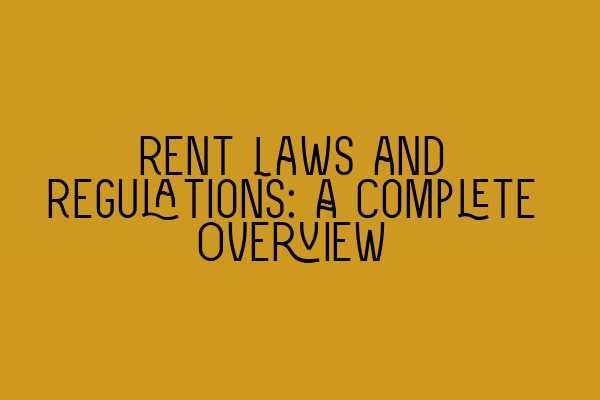Rent Laws and Regulations: A Complete Overview
As a property owner or tenant, it is crucial to understand the various rent laws and regulations that govern the rental market. Whether you are a landlord looking to rent out your property or a tenant seeking to ensure your rights are protected, having a comprehensive understanding of the legal framework is essential.
In this blog post, we will provide you with a complete overview of rent laws and regulations, covering key aspects such as rent control, eviction procedures, lease agreements, and tenant rights. Let’s dive in!
Rent Control:
Rent control is a crucial aspect of rental regulation that limits how much a landlord can increase the rent for a property. The purpose of rent control is to protect tenants from exorbitant rent hikes and ensure affordable housing options are available. Rent control laws vary by jurisdiction, with some areas having strict regulations, while others have more relaxed rules.
Understanding the local rent control laws is paramount. They dictate how often rent can be increased, the maximum allowed percentage increase, and any exceptions or exemptions that may apply. It’s essential for both landlords and tenants to familiarize themselves with these laws to avoid any litigation or disputes.
Eviction Procedures:
Eviction procedures are an aspect of rent laws that outline the legal process by which a landlord can remove a tenant from their property. Evictions can be a complicated and sensitive matter, and it is crucial to follow the proper procedures to avoid unnecessary complications.
Specific grounds for eviction need to be established, such as non-payment of rent, violation of lease terms, or illegal activities carried out on the premises. The eviction process typically involves providing notice to the tenant, allowing them an opportunity to rectify any issues or pay outstanding rent before taking legal action. It is recommended to consult with a legal professional to ensure compliance with eviction procedures.
Lease Agreements:
A lease agreement is a legally binding contract between a landlord and tenant that outlines the terms and conditions of the rental arrangement. It is essential to have a comprehensive and well-drafted lease agreement in place to protect the interests of both parties.
The lease agreement should cover aspects such as the duration of the lease, rental amount and payment terms, responsibilities for maintenance and repairs, pet policies, and any other specific terms agreed upon. It is advisable to consult with a solicitor specializing in property law to draft or review lease agreements to ensure all legal requirements are met.
Tenant Rights:
Tenant rights are set forth in various laws and regulations to protect them from unfair practices and ensure safe and habitable living conditions. Understanding these rights is crucial for tenants to assert their legal entitlements and seek appropriate recourse if necessary.
Some common tenant rights include the right to a safe and clean living environment, protection against unlawful eviction, privacy rights, and the right to receive proper notice for rent increases or termination of tenancy. Familiarizing yourself with these rights is vital to protect your interests as a tenant.
Conclusion:
Understanding rent laws and regulations is of utmost importance for both landlords and tenants. Rent control, eviction procedures, lease agreements, and tenant rights form the pillars of the rental market’s legal framework.
By familiarizing yourself with these regulations, you can ensure compliance, protect your rights, and mitigate potential disputes. Consulting with a property law solicitor can provide you with expert guidance and assistance tailored to your specific circumstances.
To further enhance your understanding of property law and prepare for the SQE exams, check out our related articles:
– SQE 1 Practice Exam Questions
– SQE 1 Practice Mocks FLK1 FLK2
– SQE 2 Preparation Courses
– SQE 1 Preparation Courses
– SRA SQE Exam Dates
Remember, staying informed and seeking professional advice can help you navigate the complexities of rent laws and regulations, ensuring a fair and lawful rental experience for all parties involved.
